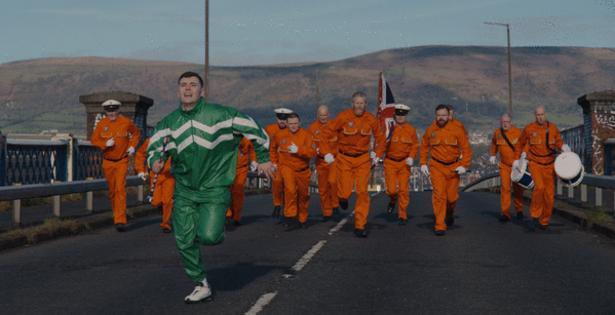Review: 'Kneecap' is a rousing Belfast hip-hop ode to native tongues everywhere
Published in Entertainment News
Now in theaters and worth seeking out, “Kneecap” joins a long list of musical biopics about how this or that artist/group/phenomenon got where they got. This one’s a rollicking, playfully serious success, a little messy but with enough juice and real moviemaking in it to spike its more familiar elements.
“Familiar” is relative here. The setting and story of the real-life three-man hip-hop sensation Kneecap in Northern Ireland’s West Belfast doesn’t court a lot of immediate comparisons — though bits of “8 Mile,” “Straight Outta Compton” and the kinetic visual zap of “Trainspotting” inform writer-director Rich Peppiatt’s feature. In 2017, five years before the Gaelic language was recognized legally in the North of Ireland, Kneecap’s Mo Chara and Móglaí Bap, along with DJ Próvaí, unleashed a torrent of anti-British, anti-colonialist, pro-drug and pro-hedonism-in-general lyrics in unsuspecting venues, largely in that historically disallowed Irish tongue.
The backdrop of “Kneecap,” inevitably, is the Emerald Isle’s political warfare and Belfast’s “Troubles” (ridiculous word, considering the size of the troubles) in particular. The movie’s freely but creatively fictionalized version of events addresses the usual somber Belfast clichés in its opening seconds, jamming newsreel snippets of bombed buildings and exploding cars into a one-off quickie, just to get it out of the way. Director Peppiatt manages a shrewd balancing act throughout “Kneecap,” treating much of it for dark humor and exuberant myth-making while playing the human stakes realistically when it counts.
Bap’s offstage name is Naoise Ó Cairealláin; he plays himself in “Kneecap,” as does his best mate and fellow rapper Liam Óg Ó Hannaidh, aka Mo Chara. They’re easy, engaging screen performers; a tick or two up from there, the music teacher and Irish-language activist JJ Ó Dochartaigh, aka DJ Próvaí, likewise as himself. There’s a lot to juggle narratively within the film’s brisk, roughhouse 100 or so minutes, including a subplot dealing with Bap’s fugitive father, wanted for various IRA-implicated car bombings and played by Michael Fassbender.
This is all recent, roiling history, since Kneecap and its international popularity with dissident-loving, screw-the-establishment-backing millions worldwide became a thing a mere three years before COVID. There’s a well-judged amount of rehearsal and concert footage in the film, with impish English-language subtitles darting here and there mid-song, with more conventional subtitling for dialogue scenes.
If “Kneecap” has a somewhat pushy sense of broad comedy or, in the final third, some predictable dramatic beats, its visual invention wins the day, because it’s so comfortably allied with the songs of protest and release. It moves like a streak, without a speck of solemnity, even when it’s focusing on the beauty of the language — whether describing sex, “stealing 20 from yer Da” for cocaine, or drug dealing (which these guys did). Or the more searching, poetic aspects of lives lived under siege.
You can enjoy “Kneecap” without thinking about the politics that made Belfast what it is, and isn’t, today. But that’s not really the way to watch anything so innately, inescapably political.
———
'KNEECAP'
3 stars (out of 4)
MPA rating: R (for pervasive drug content and language, sexual content/nudity and some violence)
Running time: 1:45
How to watch: Now in theaters
———
©2024 Chicago Tribune. Visit chicagotribune.com. Distributed by Tribune Content Agency, LLC.
















Comments